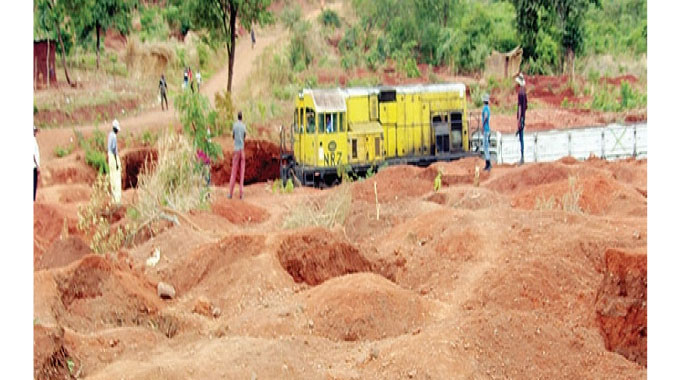Tales of a top female combatant

Thandeka Moyo-Ndlovu, Senior Reporter
WHILE many teenagers live to celebrate their birthdays in style, Cde Grace Ethel Noko decided to mark her 16th birthday by joining the liberation struggle which ushered Zimbabwe’s Independence in 1980.
Born on July 22 in 1959, the unsung heroine from Bulawayo’s Emganwini suburb says joining the struggle mentored her to become one of the few female instructors during the liberation struggle.
Hailing from Halusipi Village in Gwanda District which is about 12km from Botswana, Cde Noko remembers the evening of July 14 in 1975 when the thought of going for war first crossed her mind.
It was a week before her 16th birthday and when her grandfather who was sold to wise waters jokingly asked why she was still at home when others were at war, she knew she wanted to give her all for the independence of her people and country.
“That day during the evening prayers I then started the discussion and managed to convince my three cousins to escape and join others who were already at war. After some deliberations we decided that although we were young girls, we had had enough of our parents’ unending bitter stories of the abusive and draconian Smith regime,” says Cde Noko.
The quartet eventually sneaked out of their home the following morning and started on a journey crossing the Shashe River with nothing except the clothes they were wearing and extra jerseys since it was winter, they were determined to join others who used to pass by their home daily, on their way to Botswana which was an exit point for those who joined the liberation struggle.
“We simply walked to my aunt’s place who lived in Botswana and pretended we were there just to prepare for a church service just to put her at ease. After two days we had gathered all necessary information and we slipped and went to Bobonong. From Bobonong we were taken to Selibe-Phikwe,” she said.
“We spent some time at Selibe-Phikwe Prison sharing a cell with no blankets and being treated like inmates just to confuse the enemy. After some time, we were moved to Francistown where we spent two months at a Zapu house in Blue Town where we were joined by some girls from Beitbridge. We stayed there familiarising our young selves with the reality that could befall us but we never looked back until December (1975) when we were flown to Nampundwe Transit Camp in Zambia.”
For Cde Noko, real training started when she had to endure some rigorous activities as a young girl just to be deemed fit to go and fight the colonisers.
She even remembers having to ask male commanders for leniency during her menses just to breathe for a few days.
“We used to bathe by the river daily and during menses we would ask the commander on duty to at least give us a break from the physical routines. Sometimes they would refuse and we had to climb mountains, lift weights and still be careful enough not to spoil our uniform,” she said.
Cde Noko said the training saw many women like her wear trousers for the first time as back then only men wore them.
“Those days were tough but within a short space of time we had mastered the art of bathing by the river, intense exercises in the wee hours of the morning and using guns. In no time I was able to keep up with my male colleagues and do almost everything they could do because I was just hungry for victory,” she says.
“It was tough, but I had no regrets with the decision I had taken. On learning of the presence of girls, the President of the party, the late Vice-President Joshua Nkomo tried to stop us from undergoing military training, but we pleaded with the commanders to allow us and at the end of the day they accepted our request.
“After spending about three months at Nampundwe, we were moved to Mwembeshi in Tanzania for real military training and I am proud to say I was part of the group of 800 to open that camp and of those there were just nine women.”
Cde Noko said the day she was made an instructor in 1978 together with Cde Toriso Moyo-Phiri was a dream come true.
“There were about 300 recruits at Mwembeshi and among those were 52 women. At first some male recruits naturally tried to be funny, but because Thoriso and I were very strong they changed their attitude, it was easy to be their instructor eventually,” she says.
Cde Noko said she has lost count of the people that she trained before she was sent to Cuba for further training in military intelligence.
She said it was regrettable that while her parents struggled during the Smith regime, she has nothing to show for her sacrifices.
“I vividly remember how I lost my cousin and other relatives from Gwanda during a Zipra-Zanla clash and many people lost their lives then. We however, continued training more cadres and women were now joining forces as some would come with babies strapped on their backs asking to be deployed so they help in fighting colonisation,” she said.
Her military journey should stand as a guide to Zimbabwean women who too are faced with a number of challenges even post-independence.
She said there can be no victory in anything without a woman hence the same should be willing to stand up and fight whatever that is standing between them and their successes.
“I cannot say much about how we have been treated after sacrificing our youthful lives for this country. It’s a depressing topic for another day. However, I would like to encourage women to rise and continue to fend for their families and communities because we know we are capable. I too didn’t know of my capabilities until I took the first step,” said Cde Noko.
“The reason why a woman is called imbokodo is imbokodo iyachola loba yini, kumbe lidobi kumbe amabele, akulanto ehlula imbokodo. This women’s month we should reflect on all achievements that women have attained in our communities, both small and great and allow those to keep motivating us to be more powerful, more influential and more daring.”











Comments